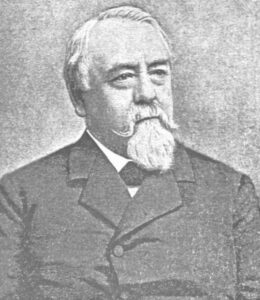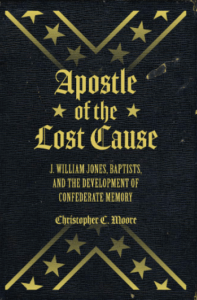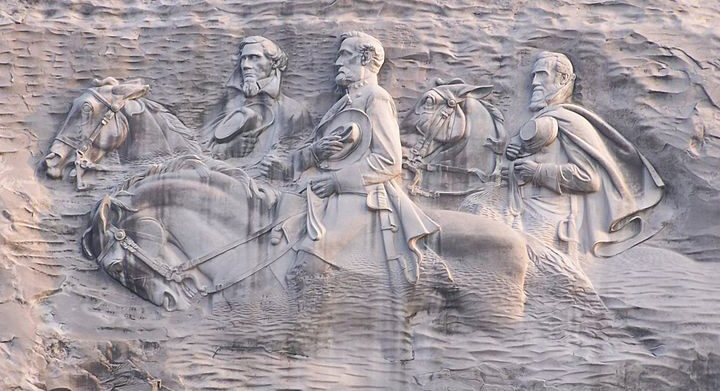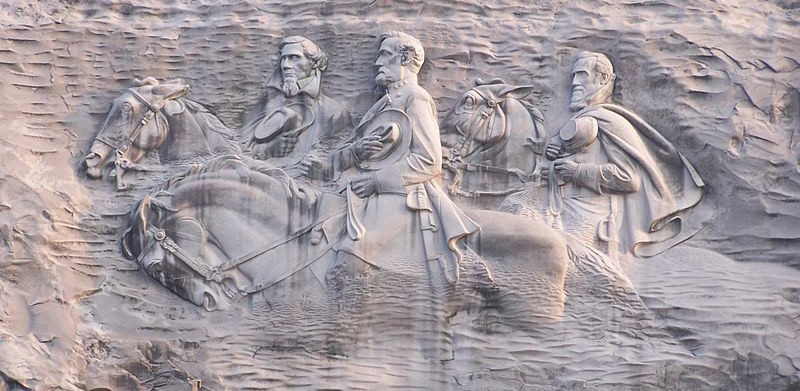A Baptist Civil War figure and the Lost Cause narrative he helped create are very much alive today in the growing wedge between Christians and how to teach history, Christopher Moore said during Baptist History and Heritage Society’s first “Making Baptist History Public History” webinar.
In presenting an overview of his book, Apostle of the Lost Cause: J. William Jones, Baptists, and the Development of Confederate Memory, Moore connected the development of post-war Southern mythology about the conflict with the strains of white supremacy and Christian nationalism currently pulsing through American politics and culture.
“That temptation to merge religion and nationalism, that’s not unique to J. William Jones, it’s not unique to Baptists, it’s not unique to the South and it’s certainly not unique to the 19th century. That is still very much a temptation to tie nationalism with faith, and if we don’t recognize that, we do that to our own detriment,” Moore said during the April 28 Zoom event hosted by First Baptist Church of Carrollton, Ga.

J. William Jones
Jones was thoroughgoingly Baptist and Southern and saw his Southern Baptist denomination and the Confederacy as naturally intertwined, the historian reported. Ordained in 1860 with missionary aspirations, his goal of serving in China was supplanted by the war, during which he served as a chaplain and evangelist for the Confederate army.
After the conflict, Jones held various pastorates, served as an agent of the Southern Baptist Foreign Mission Board and Southern Baptist Theological Seminary, worked as a staff writer for the Religious Herald newspaper in Virginia and served as editor of the Southern Historical Society Papers from 1876-1887. (BNG is a successor to the Religious Herald through a merger with Associated Baptist Press.)
Before his death in 1909 in Columbus, Ga., Jones also served as chaplain for the universities of Virginia and North Carolina and as secretary and superintendent of the Confederate Memorial Association.
The Virginia native also penned numerous books, including two volumes of the letters of Confederate Gen. Robert E. Lee, a reflection on Confederate President Jefferson Davis and Christ in the Camp, his influential 1887 account of a series of religious revivals that swept through the ranks of the South’s military forces.
Through his writing, editing and preaching, Jones became a primary shaper and promoter of the mythology of the Lost Cause, which enshrined white Southern history and venerated Confederate heroes in an attempt to reshape and defend the Southern cause and character after the war, Moore said.
“Being editor of the Southern Historical Society Papers … they essentially become one of the primary vehicles for the spread of the Lost Cause, and some people will point to Jones as being, as much as anyone else in the post-war South, a primary shaper of the Lost Cause.”

Christopher Moore
Jones was able to choose which letters to include, edit and redact, and was known to omit pro-slavery references by figures like Lee, Davis and Stonewall Jackson. “So we might say he’s like someone taking all the pieces of Confederate memory and then making a mosaic out of them,” Moore said.
Jones also infused his religious worldview into that portrait of the South, the historian added. “He’s very much going to merge the destiny of the Confederacy with this Baptist faith. He’s going to hold them together.”
The most pivotal event to influence Jones’ belief in the divine blessing of the South was the religious conversions he witnessed in the Confederate army during the war, Moore said. “He’s ultimately going to argue that these revivals demonstrate God’s favor on the South and, by extension, on the Confederate cause.”
Jones’ fingerprints on the Lost Cause also may be be seen in its major tenets, Moore added. “Many white Southerners came to believe that white Southerners were more godly, were more biblical, were more Christian than their Northern counterparts.”
The role of slavery and emancipation as a cause of the Civil War is completely denied the South’s mythology, which instead championed rhetoric about “state’s rights” and preserving Southern heritage and self-determination, he said.
“We are going to see some of these same arguments … resurfacing throughout the 20th century into the 21st century,” Moore said. “There are a number of historians who would say the South wins the battle for the narrative, at least in many parts of the country. White Southerners tell the story, and not only does the story get into white Southern psyche, it gets into the schoolbooks, it literally becomes the way many white Southerners grow up thinking about the American Civil War.”
 But the seeds of division that led to the Civil War, and eventually to the Lost Cause, were first evidenced by denominational splits that predated the conflict, Moore explained.
But the seeds of division that led to the Civil War, and eventually to the Lost Cause, were first evidenced by denominational splits that predated the conflict, Moore explained.
“Somewhere along the lines in the 19th century, Christians in the North and the South could no longer talk to each other. … Well before the political divisions manifest in 1860, ecclesial divisions had portended that: the Methodists in 1844, Baptists in 1845, Presbyterians in 1861. These evangelical denominations are splintering, and part of the reason was they were disagreeing about the Bible, and they had lost the ability to talk to each other.”
Those conditions clearly exist between people of faith in modern times, including around the debates about Confederate monuments, Moore said. “Today I hear a lot of people talk about Christians who can’t seem to communicate any longer, as if we’re talking two different languages whether its hermeneutics, whether its theology, whether its politics, that we don’t even have enough ground anymore that we’re living in the same reality. That is a frustration a lot of us share. I would also caution that is a very dangerous place to be.”
Jones’ powerful role in helping create such a divided space evoked the role of apostleship referenced in Apostle of the Lost Cause, Moore explained.
“Apostles had primarily two functions. No. 1, to preserve a faithful narrative of the life, death and resurrection of Jesus Christ, and second, to testify to God’s incarnation in Jesus Christ,” he said. “Once I started analyzing Jones through that lens, I felt that I could really see what was making him tick. He doesn’t just flat out call himself an apostle of the Confederacy, but he very much functions as one.”
Related articles:
Of statues and stories: Reckoning with the Lost Cause | Opinion by Greg Garrett
Tearing down statues doesn’t erase history | Opinion by Ella Wall Prichard
At the intersection of Monument(s) and Avenue(s), a new vision rises | Analysis by Craig Martin


